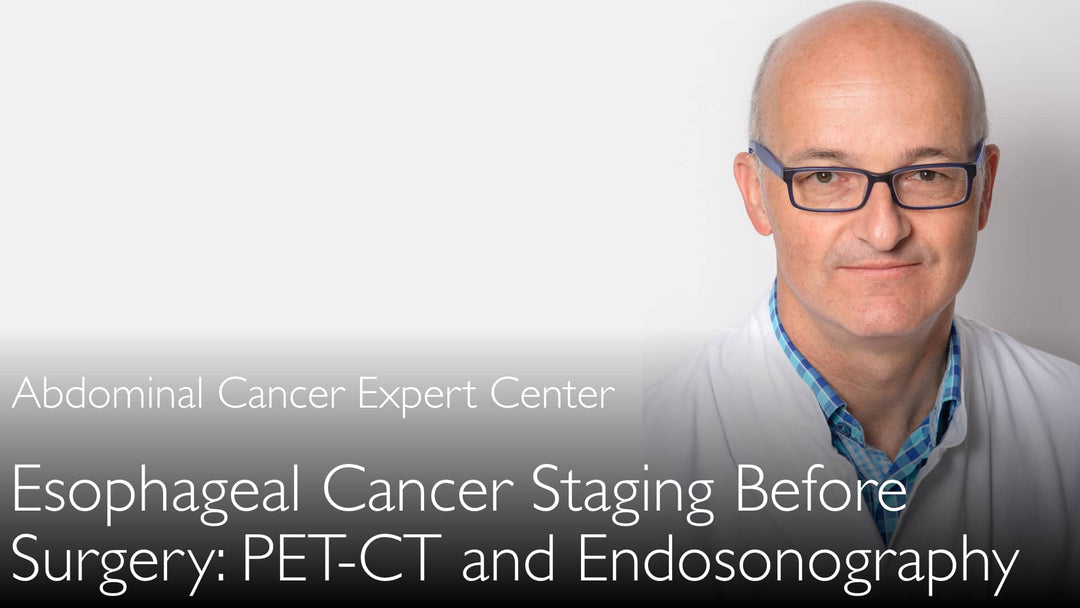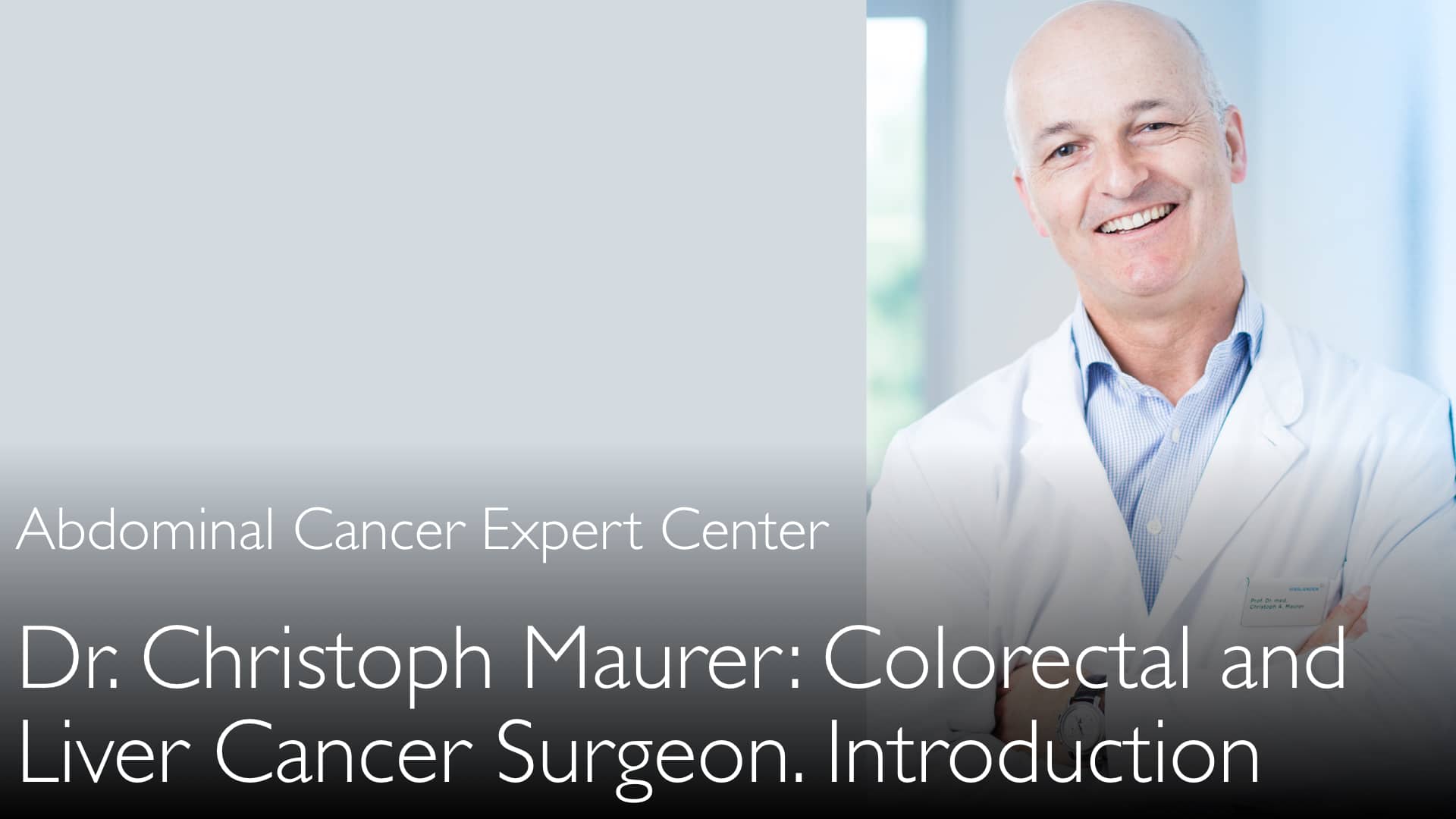Leading expert in esophageal cancer surgery, Dr. Christoph Maurer, MD, explains the critical role of accurate preoperative staging. He details how PET-CT scans and endosonography guide treatment decisions. Correct staging determines the need for neoadjuvant therapy. It also defines the surgical approach. Precise staging is essential for curative treatment and optimal patient outcomes.
Advanced Esophageal Cancer Staging: PET-CT and Endoscopic Ultrasound
Jump To Section
- Importance of Accurate Staging
- Role of PET-CT Scan
- Role of Endosonography
- Impact on Treatment Strategy
- Surgical Planning and Outcomes
- Full Transcript
Importance of Accurate Staging
Correct staging of esophageal cancer is the foundation of personalized, multimodality treatment. Dr. Christoph Maurer, MD, emphasizes that survival depends on this precision. Esophageal cancer is often diagnosed at a locally advanced stage. Accurate staging allows oncologists to tailor a combination of radiation therapy, chemotherapy, and surgery. Dr. Anton Titov, MD, notes that this process helps avoid surprises during an operation.
Role of PET-CT Scan
The PET-CT scan is a primary tool for detecting distant metastases from esophageal cancer. Dr. Christoph Maurer, MD, explains that this imaging modality identifies areas with increased metabolic activity. These areas are suspicious for cancerous tissue. The scan evaluates both local and regional lymph node spread. A lymph node in the mediastinum or cervical region showing high metabolism likely contains cancer metastases.
Role of Endosonography
Endoscopic ultrasound, or endosonography, provides detailed imaging of the primary tumor stage. Dr. Christoph Maurer, MD, states this procedure determines if the cancer is infiltrating neighboring organs. Invasion into surrounding tissue classifies the tumor as T3 or T4. Endosonography also meticulously examines lymph nodes near the tumor and throughout the mediastinum for signs of metastasis.
Impact on Treatment Strategy
Staging results directly dictate the treatment pathway for esophageal carcinoma. Dr. Christoph Maurer, MD, confirms that detecting lymph node metastasis influences the entire strategy. More extensive disease often requires neoadjuvant therapy. Neoadjuvant treatment involves chemotherapy and radiotherapy administered before surgical operation. This approach aims to shrink the tumor and improve surgical outcomes for a curative intent.
Surgical Planning and Outcomes
Precise preoperative staging is indispensable for surgical planning in esophageal cancer. Dr. Christoph Maurer, MD, calls the correct indication for surgery one of the most critical aspects. Knowing the exact tumor extent allows surgeons to plan the necessary resection. They must remove locoregional lymph nodes along with the primary tumor. Dr. Anton Titov, MD, concludes that this comprehensive approach is vital for successful curative treatment.
Full Transcript
Survival of patients with esophageal cancer depends on correct treatment. Usually it is a multimodality treatment: radiation therapy, chemotherapy and surgical operation.
How to ensure correct tumor staging in esophageal cancer? Leading Swiss cancer surgeon explains surgical staging decisions for esophageal carcinoma.
Esophageal cancer is often diagnosed at a locally advanced stage. Correct staging of esophageal carcinoma is very important. It allows us to personalize multimodality treatment for each esophageal cancer patient.
Dr. Anton Titov, MD: How do you stage newly-diagnosed esophageal cancer? What are the main methods of esophageal cancer staging? How does correct staging affect optimal treatment strategy for patients with esophageal cancer?
Dr. Christoph Maurer, MD: The two most important examinations in esophageal cancer staging are PET-CT scan and endosonography. With the PET-CT scan we are looking for distant metastases from esophageal cancer. We also look for the local and regional lymph node cancer spread.
In a PET-CT scan, you can see the locations with increased metabolism. They are always suspicious for tumorous tissue. A lymph node in the mediastinum or at the cervical level can have increased metabolism. Then you should think that these lymph nodes have cancer metastases.
The same is true in endosonography. You look for the primary tumor stage. You determine if esophageal cancer is already infiltrating neighboring organs. Esophageal carcinoma could infiltrate the surrounding tissue from the esophagus. This makes it a T3 or T4 tumor stage.
You also look for lymph node metastases near the esophageal cancer tumor and along the mediastinum. If you detect lymph node metastasis, it influences your surgical operation strategy to remove esophageal cancer. Because you have to remove these locoregional lymph nodes together with the primary esophageal cancer tumor.
It's very important that we do accurate preoperative staging of esophageal cancer before surgery. Correct staging of esophageal carcinoma also allows us to decide about chemotherapy. We should treat patients with more extensive esophageal cancer with neoadjuvant therapy.
Dr. Anton Titov, MD: You do chemotherapy and radiation therapy before doing the surgery?
Dr. Christoph Maurer, MD: Exactly. The word "neoadjuvant" means the treatment before surgery. We always have the intention to cure the patient.
Dr. Anton Titov, MD: So staging of cancer before surgical operation is very important. First of all, correct staging helps the cancer surgeons to know the extent of surgical operation they have to do. They are less likely to encounter any surprises during the surgery. That's a critical part for the successful curative treatment of esophageal cancer.
Dr. Christoph Maurer, MD: Absolutely. The correct indication for esophageal cancer surgery is one of the most important things in these tumors.
Dr. Anton Titov, MD: So, to summarize. There are two important modalities of preoperative staging of esophageal cancer. They are endoscopic ultrasound and the PET-CT scan.
Dr. Christoph Maurer, MD: Correct, yes.
Dr. Anton Titov, MD: Dr. Maurer, thank you very much for this very interesting conversation. We had an extensive conversation about colorectal cancer. We discussed cancer resection and techniques of liver tumor resection. We also talked about esophageal carcinoma.
It's very informative and we hope to come back to you in the future. It's an informative discussion for all the patients who would consider your expertise in treatment or in opinion about these multiple and serious conditions. Thank you very much!
Dr. Christoph Maurer, MD: Thank you also, Dr. Titov, for your kind invitation.
Dr. Anton Titov, MD: Thank you!





